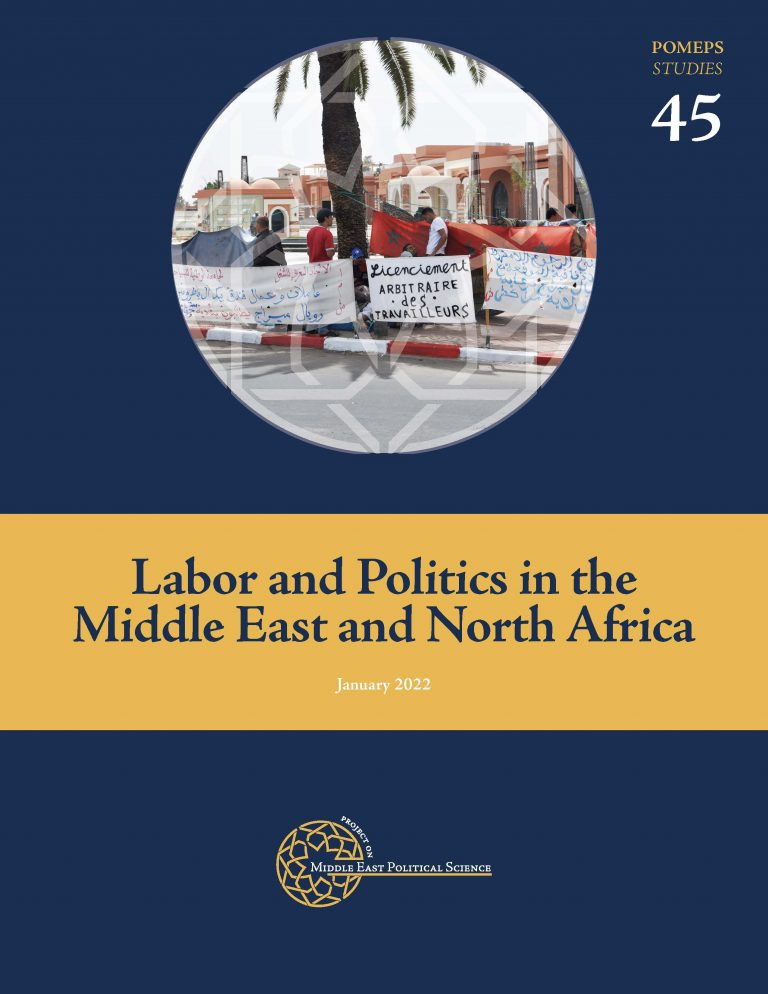Labor Politics in the Middle East and North Africa
Two rich new journal collections shine a light on a rising research programme
In April 2021, POMEPS partnered with my colleagues Dina Bishara and Ian Hartshorn to hold a virtual workshop on labor and politics, a thematic issue where they saw a strong emerging research community exploring related themes across the Middle East and North Africa. It should have been a lovely return to Cornell University, my alma mater, but what with the whole COVID thing we held the workshop virtually. The resulting publication can be downloaded for free here. As we framed it in the introduction,
“Economic grievances were at the heart of the Arab uprisings which erupted a decade ago. In many countries, such as Egypt and Tunisia, organized labor actions as well as localized workplace mobilization had been rising for years before 2011. Rising inequality, inflation, poor working conditions, and shortages of quality jobs fueled frustration with regimes which seemed uninterested in responding effectively. The centrality of those grievances and the workers articulating them has led to a growing research community focused on organized labor in the Middle East and North Africa.”
The papers in that collection ranged widely, with case studies including Egypt, Algeria, Tunisia, Iran, Israel, Saudi Arabia, Turkey, and Jordan (as well as cross-national work). Key themes included the variation in institutional arrangements through which labor was organized and represented politically, workers in the informal economy, the daunting challenges facing youth hoping to find employment, and the importance of labor market segmentation for explaining a wide range of persistent negative outcomes. I learned a lot from the participants at this fascinating workshop and from editing the papers for publication; check it out if you’re interested.
I was delighted to learn the other day of the publication of the special issue of ILR Review that had been the ultimate target of that workshop. Dina Bishara’s introduction nicely sets out the intellectual agenda and the range of contributions; here’s the abstract:
Despite its political and strategic importance, the Middle East and North Africa (MENA) region has been largely absent from cross-regional comparative treatments of industrial and labor relations. This special issue builds on a rich, multidisciplinary, and methodologically diverse body of research on labor and employment in the MENA, bringing together a collection of cutting-edge work in this field. The goal is to bring the study of the MENA into conversation with international and comparative scholarship on industrial and labor relations and to encourage more systematic inclusion of the MENA in comparative work. Drawing on research on Egypt, Jordan, Morocco, Tunisia, Israel, and the Gulf states, contributors to this special issue advance comparative scholarship on migration, labor market outcomes, worker agency, and the relationship between unions and precarious workers. This introductory essay situates these contributions in the context of three bodies of research in the study of labor in the MENA: resistance and contentious activism, labor market challenges, and migration.
Contributions to the special issue include Jonathan Preminger and Assaf Bondy’s study of non-citizen Palestinians in Israel’s construction sector (which originally was slated to be in the POMEPS Studies collection but is better placed here); Saerom Han’s case study of Tunisia’s public sector (available open access); a comparative analysis of study-to-work transitions in Egypt, Tunisia and Lebanon by Ragui Assaad, Caroline Krafft and Collette Salemi; an assessment of migrant domestic laborers in the Gulf by Lisa Blaydes; and an extremely timely survey of Tunisian public opinion towards sub-Saharan African labor migrants by Matt Buehler, Kristin Fabbe and Eleni Kyrkopoulou. It’s a rich set of papers, well worth checking out.
Coincidentally (or not), the ILR Review special issue is only one of two such journal collections to appear recently. There’s a great set of articles on political economy themes put together by Irene Weipert-Fenner in Mediterranean Politics; most were published advance view over the last several months, with a special section forthcoming in an upcoming issue of the journal. It’s another stellar group of papers which range widely across issues related to labor and politcs in the MENA region. Weipert-Fenner contributes one article on conflicts over political economy in Egypt and Tunisia post-2011 and another on budget politics in Tunisia; Nadine Abdalla examines the new labour law in post- 2014 Egypt; Amr Adly looks at the taxation regime in Sisi’s Egypt (2014-2021); and Bassem Karray explores the shortcomings of decentralization reforms in Tunisia.
Taken together, these collections all point to the growth and development of the research community on labor and politics in the MENA region. Bishara and Weipert-Fenner have done great work in bringing researchers working on these themes together, particularly outstanding younger scholars from the MENA region, and generating substantive comparative discussion across the region. The challenges of youth unemployment, political repression of organized labor, exploitation of migrant labor, weakness of non-oil sectors, and general economic malaise won’t be going away any time soon. The challenges facing the MENA region aren’t really that exceptional in global comparative perspective, and its experience should be more a part of the broader disciplinary discussion.
I only wish more of these papers were open access; maybe after reading this post, Sage and/or Taylor and Francis would like to make them free to read for just a little while? Open access leads to more citations which is really good for your impact factors, I’m just saying. I’m not a political economy expert myself, but I think people like free things.




